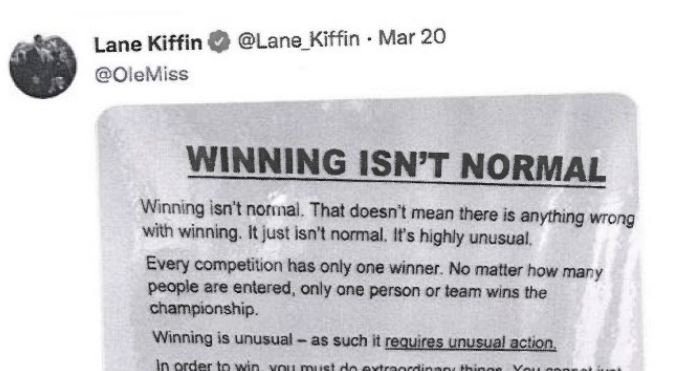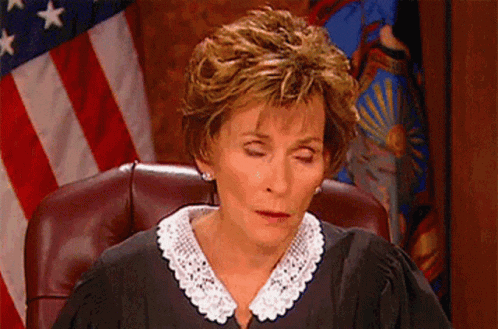A few years ago, I summarized Keith Bell’s copyright enforcement efforts:
Bell published a short book in 1982. It contained a passage that has become a meme in the sports community. Bell has separately registered a copyright in the passage. Bell has filed at least 25 copyright lawsuits.
Two prior blog posts on Bell’s litigation efforts:
* * *
This case involves Ole Miss football coach Lane Kiffin, who tweeted a photo of the passage on March 20, 2022. The court opinion includes a screengrab of the tweet (see page 3). I’m displaying only a portion of it to further strengthen my fair use position so I’m less likely to be Bell’s next target. The image shows how Kiffin apparently tweeted a photo of a piece of paper posted somewhere (possibly taken through a glass window?), rather than a more typical meme display:
The judge has a negative impression of Bell’s copyright enforcement campaign:
there will always be some litigants who seek to abuse [copyright law], and this court believes that there is good reason to suspect that this case involves such a litigant…
This court notes that plaintiff appears to have an exceedingly high opinion of the literary value of his WIN passage, proclaiming on his website that “[t]he separately copyrighted Winning Isn’t Normal passage (“WIN”) is likely the most read & widely used literary work in history!” This extraordinary assertion, with which Shakespeare, Tolstoy and Faulkner might take issue, [FN] frankly causes this court to wonder whether it is dealing with a litigant whose feet are firmly planted on the ground. While this court might ordinarily suspect that such an assertion was made in jest, there is nothing funny about the dozens of lawsuits which plaintiff has filed against numerous entities which, as the Fifth Circuit noted in Eagle Mountain, were mostly “public schools or nonprofits.” Moreover, while the defendant in this case, a wealthy and famous football coach, is considerably less of an “underdog” figure than many of the other entities that plaintiff has sued, Kiffin does have the advantage of being a defendant living in this circuit who made the allegedly offending Twitter post after the Fifth Circuit had issued its opinion in Eagle Mountain.
[Eric’s Note: Mississippi is a Fifth Circuit jurisdiction, so the Fifth Circuit’s Eagle Mountain ruling is binding precedent on this court].
This court notes that, following the Fifth Circuit’s decision in Eagle Mountain, plaintiff appears to have simply shrugged his shoulders, loaded his covered wagon and taken his traveling litigation show to the next courthouse…
This court strongly disagrees with plaintiff’s assertion that it should ignore the fact that he has recently been sanctioned with attorneys’ fees in two very similar actions and concentrate solely upon his allegations in this case…
Having now seen plaintiff’s traveling litigation show make a stop in its courthouse, this court is not required to ignore the facts that 1) reviews of that show are filtering in from surrounding communities, and 2) those reviews are not at all positive….
this court concludes that there is even greater cause to doubt plaintiff’s good faith in filing this and other similar actions than when the Fifth Circuit in Eagle Mountain identified him as “a serial litigant, who makes exorbitant demands for damages in hopes of extracting disproportionate settlements.”
[FN: Any list of most-read literary works of all time would likely include the Bible. Wikipedia lists the best-selling books of all time, which is a good prospect list for the most-read and most-widely used literary works. Tolstoy’s War and Peace does not rank near the top. Faulkner’s books don’t appear on the list at all. The judge doesn’t appear to be a fantasy/sci-fi fan, because better candidates for most-read literary works would include the Harry Potter and Tolkien series. Surprisingly, Bell’s book doesn’t appear on the Wikipedia list at all. It must be all of that copyright infringement keeping sales down.]
The court’s bottom line: it will consider Bell’s past litigation behavior as part of the fair use defense, which makes sense because the fair use defense is equitable in nature…and who wants to favor a copyright owner for repeated bad-faith enforcements?
when a plaintiff’s claimed interest in protecting his intellectual property rights in a particular work has been repeatedly found by federal courts to be of a bad faith nature, it is entirely appropriate that courts in subsequent actions consider this fact in making their rulings. This court believes this to be appropriate not only based on those courts’ interests in correctly applying the fair use factors, but also as a judicial defense mechanism to prevent litigants from using the federal courts as a dumping ground for their abusive lawsuits.
Maybe this song inspired Bell…
* * *
Having contextualized this lawsuit as part of Bell’s broader enforcement campaign, the court then turns to the fair use factors:
Nature of Use. The court says:
Kiffin’s tweet of the WIN Passage involved him posting what was quite obviously a photocopy of a printout of the quote. This court regards this fact as significant, since, it believes, any reasonable person reading the tweet would assume that Kiffin was quoting someone else’s words, rather than presenting his own thoughts….anyone reading Kiffin’s tweet would assume that this was simply him saying, in effect, “somebody said this, and I thought it was worth sharing.” This strikes this court as being the sort of contribution to the exchange of ideas which copyright law should be very hesitant to find unlawful, particularly when the quote in question is of such a harmless and non-commercial nature as the WIN Passage….
the sharing of an inspirational or uplifting quote is something which many Americans would find to represent an appropriate, or even laudable, use of social media, even if the poster is unable to remember exactly who said it. This court further believes that courts should be very hesitant to find that, by posting an inspirational quote in this manner, a social media poster has violated copyright law
The court seems to be hinting that author attribution provides a defense to copyright infringement, or at least a pro-defense fact in the fair use analysis, but it is not.
The court apparently embraces social media meme culture without using the words. As discussed in the King case, there is no “but-it’s-a-meme” defense to copyright infringement, but some judicial deference should be given to meme usage given its importance to how people socially express themselves nowadays.
The court suggests that Kiffin had also tweeted Bell’s passage in 2016 but took it down then. The court disregards any precedential effect of that event because the Eagle Mountain ruling took place in the intervening years and thus should have emboldened Kiffin about his fair use rights: “a reasonable person in Kiffin’s position who cared to research the issue would have concluded that he had every legal right to re-tweet the WIN Passage, at least in this circuit.”
Nature of the Work. “the WIN passage, while hardly an earth-shattering bit of insight, does constitute a work of creativity which a number of coaches and teams have deemed worth sharing.”
Amount Taken. Bell argued that his complaint never alleged that the WIN Passage was available in full online. This is more relevant to the nature of the work, i.e., is the work published or unpublished? The work is clearly published in the book either way, so the work’s availability online shouldn’t matter to the factor about the amount and substantiality of the copied portion.
In any case, the court rips into Bell:
This is the sort of too-clever-by-half argument which this court dislikes under any circumstances, but which it finds particularly distasteful within the context of plaintiff’s ongoing abuse of the copyright litigation process. In so stating, this court takes judicial notice of the fact that anyone who visits plaintiff’s website today can see the entire WIN Passage for free, at several different links on that site. Moreover, plaintiff does not dispute that this was also the case when Eagle Mountain was decided. That being the case, it certainly stands to reason that Bell’s website offered visitors free views of the WIN Passage at the time Kiffin made the tweet at issue in this case, and at no point in his briefing does plaintiff deny that this is the case. Plaintiff has instead chosen to take a coy “I’m not saying it is, but I’m not saying it isn’t either” position on this issue, with which this court has little patience
Market Effect. “Kiffin merely tweeted one paragraph out of an entire book, and it is simply not plausible to this court that because of that tweet, even a single individual who might have otherwise purchased plaintiff’s book decided not to do so.”
Focusing on the book passage as its own standalone work doesn’t help Bell. “The Fifth Circuit thus found that Bell had been unable to demonstrate any real licensing market for his quote.”
The court rips into Bell again:
Using this court’s judicial experience and common sense, it seems clear that the actual income stream which plaintiff has found for his WIN passage is by using it as a basis for shakedown lawsuits in which he seeks to obtain settlements from defendants who made the mistake of tweeting a post from an individual who incorrectly regards himself as the author of “the most read and widely used literary work in history.” This is, however, an income stream based upon an abuse of the judicial process, and this is an abuse which, this court believes, the federal courts have an obligation to prevent
🎯🙏 I can smell a 505 fee shift coming for the defense, as it should. Fee-shifts hink the business model of serial copyright enforcers because it causes their profit meter to run in reverse.
The court concludes that the fair use defense prevails and dismisses the case.
State Action?
Separate from the fair use discussion, the court ruminated about whether Kiffin tweeted on his own behalf or as a state employee, which matters because qualified immunity might apply if Kiffin was tweeting on behalf of the state. The court says it “tends to believe that a Twitter post about “winning” which was written by Kiffin on an account which clearly identifies him as the head football coach of the University of Mississippi is most likely one which was made on behalf of his employer.”
This is an opposite result than the bulk of the post-Lindke rulings that are treating social media accounts by government employees as private accounts–when treating the accounts as government accounts would create liability.
Other Notes
Under Coach Kiffin, the Ole Miss football team has been on a roll. It went 9-3 this year and will be appearing in the Gator Bowl next week (which it’s favored to win by 2 touchdowns). Copyright plaintiffs will find more success suing the Ole Miss football coach in a Mississippi court when the team isn’t doing well LOL.
Bell’s lawyers in this case are John R. McCarroll, III of Burch Porter & Johnson in Memphis and two lawyers from Loeb & Loeb: Keane A. Barger and Timothy L. Warnock. I don’t think they will want to list this opinion in their firm bio “representative matters.”
Something about Bell’s copyright enforcement campaign made me think of this song. (I have a half-dozen songs by The Sound in my 1980s playlist). I invite your suggestions of other winning-themed songs that might characterize Bell’s campaign.
Case Citation: Bell v. Kiffin, 2024 WL 5125159 (N.D. Miss. Dec. 16, 2024)


